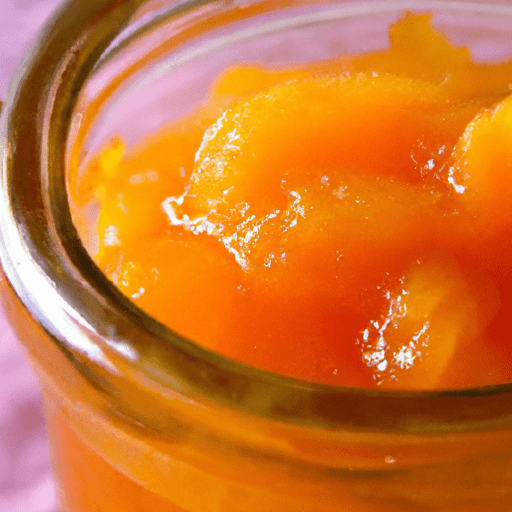Sugar-Free Apricot Preserves: A Healthy and Delicious Addition to Your Pantry
If you’re looking for a healthy and flavorful alternative to traditional sweet spreads, sugar-free apricot preserves might just become your new go-to option! Packed with the natural sweetness of ripe apricots and devoid of any added sugars, these preserves offer a guilt-free indulgence while providing a burst of flavor in every spoonful. In this article, we’ll delve into the fascinating world of sugar-free apricot preserves, exploring their taste, uses in cooking, nutritional value, and more. So, let’s get started!
Taste and Texture
Sugar-free apricot preserves are made from the finest, sun-ripened apricots, which lend them their beautifully vibrant hue and distinct flavor. These preserves strike the perfect balance between tartness and sweetness, with a deliciously fragrant aroma that is both refreshing and appetizing. The apricots are gently cooked down to a smooth and spreadable consistency, ensuring a velvety texture that glides effortlessly on your favorite bread or toast.
Culinary Uses
Sugar-free apricot preserves unlock a world of culinary possibilities in the kitchen. Their versatile nature makes them perfect for both sweet and savory dishes. Here are a few exciting ways to incorporate them into your cooking:
1. Breakfast Delights: Spread a generous amount of sugar-free apricot preserves on your morning toast or bagel for a burst of fruity goodness that will kick-start your day.
2. Flavorful Marinades: Combine these preserves with a splash of vinegar, soy sauce, and your favorite herbs and spices to create an irresistible marinade for grilled chicken or pork.
3. Sweet Desserts: Use sugar-free apricot preserves as a filling for tarts, thumbprint cookies, or as a topping for pancakes and waffles. The natural sweetness and tanginess will elevate your desserts to new heights.
4. Glazes and Sauces: Create a lip-smacking glaze by heating the preserves with a touch of mustard and balsamic vinegar. Drizzle it over roasted vegetables or grilled salmon for a delightful burst of flavor.
Nutritional Value
Sugar-free apricot preserves pack a punch in terms of nutrition. Apricots themselves are a rich source of dietary fiber, vitamins A and C, and antioxidants. Additionally, by opting for sugar-free preserves, you eliminate the unnecessary empty calories associated with traditional store-bought spreads. It’s a win-win situation - you get to indulge in a delicious treat while nourishing your body with wholesome ingredients.
Fun Facts and History
- Apricots are believed to have originated in China over 4,000 years ago and were later introduced to the Mediterranean region via the Silk Road.
- The word “apricot” is derived from the Arabic word “al-barqūq,” which means “early” (referring to the fruit’s early ripening).
- Apricot trees are known for their delicate and beautiful blossoms, adding a touch of elegance to landscapes.
- Turkey is the largest producer of apricots, followed closely by Iran and Uzbekistan.
Conclusion
Sugar-free apricot preserves offer a delicious and nutritious way to enjoy the natural goodness of apricots without the addition of sugar. With their versatile flavor profile and numerous culinary applications, these preserves are a valuable addition to any kitchen. So, go ahead and give them a try, and unlock a world of flavorful possibilities that will tantalize your taste buds and impress your loved ones. Enjoy the taste of sweetness, naturally!
Origin of Sugar-Free Apricot Preserves: Sugar-free apricot preserves are believed to have originated in France, where preserves and jams have a long culinary tradition. The apricot fruit itself has origins in China and Central Asia.
Common Uses of Sugar-Free Apricot Preserves: Sugar-free apricot preserves are often used as a spread for bread, toast, and pastries. They can also be used as a filling for cakes, cookies, and pastries. In addition to sweet applications, they can be used as a glaze for meats or a marinade for poultry.
Nutritional Benefits of Sugar-Free Apricot Preserves: Sugar-free apricot preserves are generally lower in calories and carbohydrates compared to traditional preserves. They are a good source of vitamins A and C, as well as fiber. They contain natural sugars from the apricot fruit itself, but without the added sugars found in regular preserves.
Unique Properties of Sugar-Free Apricot Preserves: Sugar-free apricot preserves are made without the addition of refined sugar, using alternative sweeteners such as sugar substitutes or natural sweeteners like fruit juice concentrate. This makes them suitable for individuals who are health-conscious, following a sugar-restricted diet, or have diabetes.
Historical Significance of Sugar-Free Apricot Preserves: Preserving fruits and making jams and preserves has a long history, dating back to ancient times. The practice of making and preserving apricot jams and preserves gained popularity in Europe during the Middle Ages and was further refined over time. Sugar-free variations of apricot preserves are a more recent development, catering to the increasing demand for healthier options in modern times.




Use the share button below if you liked it.
It makes me smile, when I see it.